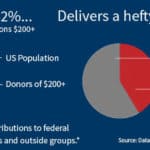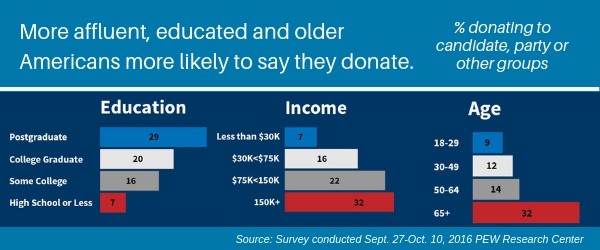
Part of the justification for the 2010 Citizens United v FEC Supreme Court ruling that allowed for unlimited spending in our political system was the idea that money is speech and thus cannot be restricted under the First Amendment.
We don’t agree that money is speech. But considering that’s the law of the land until we pass the 28th Amendment, it begs the question: When money is speech, who does the talking?
Several research organizations have reported on various components of this question, and we’ve compiled a collection of pertinent data to get a better picture of exactly which Americans have been able to amplify their voices the most using the tool of unlimited political donations.
A Tiny Fraction Gives the Majority of Dollars: Although more Americans make political donations today compared with 20 years ago, an extremely small slice of Americans make political contributions of more than $200. In fact, a tiny elite representing just 0.42% of Americans donates more than $200, yet this tiny group accounts for more than 70% of the money raised by federal candidates, parties, PACs and outside groups in the 2018 election cycle.

Most Americans Give $100 or Less: Of the 15% of Americans who report donating to a candidate or group working to elect a candidate, 55% reported donating less than $100, while 32% reported donating between $100 and $250, according to a Pew Research Center survey of the 2016 election. The remaining 13% gave more than $250.
Wealthier, More Educated, Older: Predictably, wealthier Americans contribute substantially more to political organizations than others, according to Pew Research Center. Nearly a third of households with family incomes of $150,000 or more say they make political donations, while 7% of those with family incomes below $30,000 donate. Education and age are also both strongly tied: 29% of those with a postgraduate degree donate compared with 7% of those with a high school diploma or less education; and while 9% of Americans ages 18-29 donates, 32% of the those ages 65 and above donate.

All in All, Both Parties Are Pretty Even: In 2016, 22% of Democrat supporters made a donation, compared with 10% of Republicans, according to data from American National Election Studies. This marks the first election since at least 1992 when Democrats were significantly more likely than Republicans to donate. On average, between 1992 and 2016, 15% of Republicans and 14% of Democrats reported making a donation to a candidate, party or outside groups.
Millionaires Are Extremely Over-Represented: While only 3% of the U.S. population has more than $1M in wealth, among donors giving more than $5,000 to congressional candidates, 45% are millionaires, according to a December 2016 Demos study. In 2016, both presidential candidates relied on the very wealthy—42% of the money Hillary Clinton raised and 27% of the money Donald Trump raised came from millionaires. A third of money raised by both candidates came from Americans with a net worth between $300K and $1M.
White People Are Over-Represented: The same Demos study found that, while 75% of the adult population is white, 91% of federal election donors in 2012 and 92% of donors in 2014 were white. Among donors giving more than $5,000, 94% were white in 2014 and 93% were white in 2012.
Men Donate More, But It’s Changing: Men make up slightly less than half of the population, but comprise 63% of federal election donors and 65% of donors giving more than $5,000. However, the 2018 election cycle showed a huge increase in participation by female donors, mostly benefitting Democratic candidates. The Center for Responsive Politics reports, “Democratic women have received the largest amount of money from female donors this cycle at $159 million—a significantly historic high when we are looking at general election numbers. It is nearly 2.5 times larger than the amount of money female Democratic congressional candidates raised from female donors in 2016. This is the first time we have witnessed women congressional candidates outraise men—both Republican and Democratic.”
Little Diversity Among Elected Officials: The disparities seen in political contributions seem to be mirrored in outcomes of elected officials. Despite growing diversity within the U.S. population, 90% of elected officials, from the local to the national level, are white, and most are male, according to a study by the Reflective Democracy Campaign, a project of the nonpartisan Women Donors Network. “The demographics of power are why an all-male Senate Committee was in charge of women’s health. They’re why a nearly all-white commission is making critical decisions about the ever-more fragile voting rights of African Americans and other Americans of color,” the report states.
As these reports show, political donors tend to be older, wealthier and less diverse than the overall U.S. population. We believe the 28th Amendment will make American politics more inclusive, more diverse and more representative of the majority of citizens.







